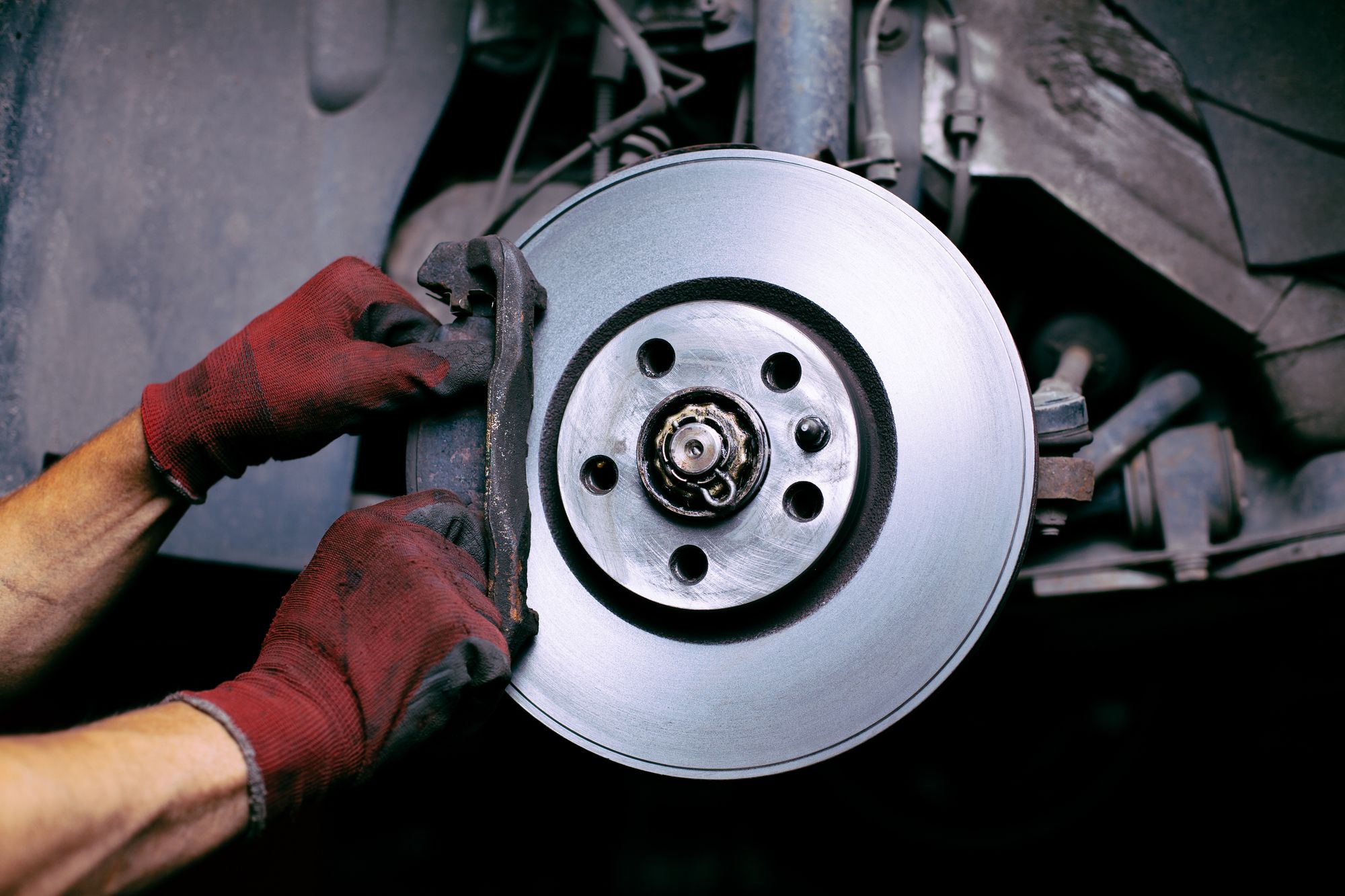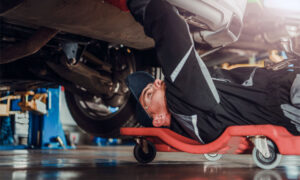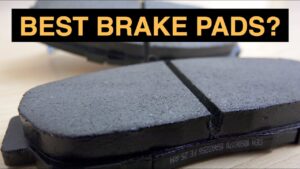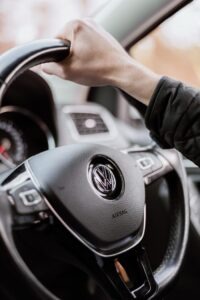Brake Pedal Squeaks When Released? Maybe your brake pads are exhausted. The brakes squeak when stopping slow proves that the brake pad wear is subsiding and need to be replaced. Sometimes even oiling or using lubricant can prevent further squeaking but if you are hearing a high-pitched squeak every time while using brakes, especially at low speed, and if you feel vibrations, it’s better to get them replaced.
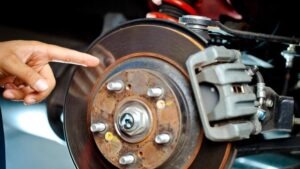
Brake pedal squeaking is one of the symptoms of bad brake pads. This is surely not something to ignore, as it can be dangerous. And the good news is that you can fix this by yourself.
Table of Contents
What Causes The Brake Pedal Squeaks When Released?
The car brake pedal creaks when released because of the dirt or rust on the brake pads or callipers. This dirt does not let them do their work properly. Callipers are supposed to hold the brake pads and release them when you step on the brake. So this means that callipers are not releasing and this is why the brake pedal squeaks.
If your brake pedal squeaks while driving, it could be rotors or brake pads, or callipers otherwise squeaking occurs because of pivot points or pivot bushing when the car is at rest. So it’s better to check whether the problem is within rotors or pivot bushing. If it’s rotors, if you feel grooves on the rotors themselves then you should take your car to Autozone as they would be able to tell you if they are worn out. If it’s your brake pads it can be seen through callipers if they are unevenly worn or exhausted.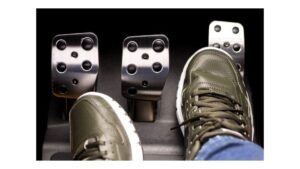 Bad brake pads aren’t the only reason when it comes to squeaky brake pedals. There could be another reason why the brake pedal squeaks when released. Some of the reasons that cause brake pedals to squeak:-
Bad brake pads aren’t the only reason when it comes to squeaky brake pedals. There could be another reason why the brake pedal squeaks when released. Some of the reasons that cause brake pedals to squeak:-
- Due to moisture or change in weather, this problem of squeaking especially appears on rainy days.
- Twisted, bent, or misshaped calliper.
- Dirt or grease tucking in between calliper and pads.
- Brake pad wear indicators getting in contact with brake disc due to worn out brake pad.
- The edge of the pads rubs along the rotors due to exhausted brake pads.
- There is a pivot point in a pedal that squeaks when a spot connected to the pedal box gets cracked due to exhaustion.
- Sometimes also a joint in the brake pedal that gets dry may lead to the squeaking of the brake pedal.
What To Do If Brakes Squeak When Stopping Slow?
There are many ways to fix a squeaky brake pedal and you may find it surprising that you can fix this problem by yourself. You don’t even need specialized tools and can do it pretty much by yourself. So let’s see what you can do to fix a squeaky brake pedal.
1. By Spraying Lubricant Or Greasing: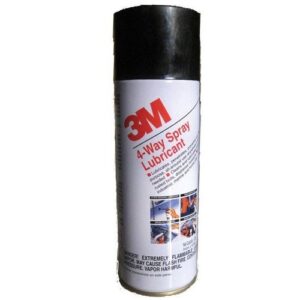
Sometimes oiling pivot points a little or lubricating them will help in lessen squeaking, as the problem of squeaking might just be dry pivot points. Greasing or spraying all-purpose lubricant at the ing area and springing the ake pedal system might help. Generally, most people recommend WD40 or grease and lubricant can also be used. So you can just get under your car’s dashboard where you can reach the bushing area and can see rotors and spring where you have to spray thoroughly. Make sure to spray well enough, not too much, and not too less. As you reach under your dashboard you can see brake pedals and spring below and also the ing area. Be sure to have some safety measures.
What If using Lubricant Or Grease Doesn’t Help:
Lubricating or greasing or using oil or WD40 is a temporary way to fix the squeaky brake pedal. So it’s recommended to replacegettgetke pads or callipers changed if they are worn out. It’s also recommended to clean your calliper and pads or get them cleaned at AutoZone as it’s something a professional can do safely.
2. By Using A Different Type Of Friction Material:
You can replace brake pads with some aftermarket metallic or ceramic pads which will change their tune, as these aftermarket pads are designed for low noise and low dust. The brake pedal squeaks when released because of calliper forcing against the rotor, so using a different type of friction material would do.
3. By Using Shims: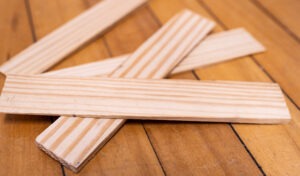
Brake shims are made of thin metal or rubber. You can fit these brake shims between the brake pad and brake calliper resulting in less noise. These pads are used to avoid brake noises, as brake shims prevent rotors or calliper and brake pads from rubbing which generates noise or squeaks. Sometimes callipers in piston couldn’t bear to allow any shimming and drag the brakes.
4. By Adhering Backing Plate To Piston Or Caliper:
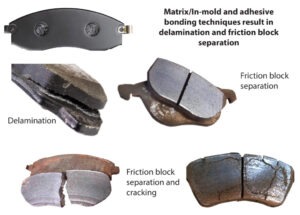
You can affix the brake pad’s backing plate to the piston or calliper by applying something which can endure water and dirt or heat, As normal glue isn’t going to work out. This also helps in curing squeaky brake pedals.
How Can You Avoid Squeaky Brake Pedals?
Flushing out brake fluid every year is what you need to do if WD40 or greasing doesn’t help. Brake fluids absorb moisture and it results in rusting on the insides and grasping the internal piston in your calliper. Replace all of the callipers at the same time and flush out brake fluid every year. This might also save your time as this problem won’t occur often.
Changing the pads is a better way to end all of this as pads are the main reason, why the brake pedal squeaks. Though you can drive even with bad brake pads, it is still dangerous as it might cause an injury. Not changing your brake pads might result in the breakage of rotors.
How Much Cost Does It Take?
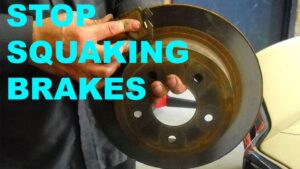
If you take your vehicle to Autozone, It may cost you around $150 per axle to get an average brake pad repaired or replaced. And these replacement prepare pairs take 3 to 5 days. If you are repairing this yourself, a set of pads should cost you around $40.00 and if you want to buy a calliper, an average calliper may cost you $60 to $200 based on the model you own.
Frequently Asked Questions-
: Here are some of the recently asked questions about what are the reasons causeway to do when the brake pedal squeaks when released?-
1. Is It Dangerous To Drive A Car With Squeaky Brakes?
: Yes, it is quite dangerous to drive a car with squeaky brakes as due to this risk becomes higher which leads to failure of brakes.
2. When I Press The Brakes In A Car, There Is A Sort Of Hissing, Almost Compressed Sir Sound Coming From The Brake Pedal. What Causes That?
: The cause for this can be because of the leaking area which means leakage in the vacuum ose master cylinder gasket.
3. Why Do Breaks Squeak?
:The first reason can be some part of foreign material.
:Next reason can be due to the friction which occurs between the metallic parts and brake pads.
4. How Do I Get My Brake Pedal To Stop Squeaking?
: The most significant solution can be spray wd-40 or white lithium grease spray.
5. Can WD-40 Stop Brakes Squeaking?
:Yes, Wd-40 Can Stop Braked Squeaking.
6. What Grease Is Best For Brakes?
:CRC Brake And Caliper Synthetic Grease. :Permatex Ultra Disc Brake Caliper Lube.
7. Will Brake Fluid Stop My Brakes From Squeaking?
: Yes, brake fluid would stop brakes from squeaking which can cause squeaking noises.
8.How Do You Stop Brakes from Squeaking When Braking?
One of the solutions to eliminate that squeaky sound is to apply lubricants on your brake pads. To do this, you will need to remove the brake pads from your brake caliper. You can then apply the CRC 05016 Disc Brake Quiet on all the contact points to effectively reduce the friction.
Conclusion:
As dirt or rust between pads and calliper or rotor can make brake pedal squeaks when pressed and released, Be sure to remove any dirt or corrosion from pairing parts before replacing or changing brake parts. You might need some cleaner, brushes to clean parts, jack stands, wrench, C-clamp, and turkey baster for drawing brake fluid out, and make sure to wear gloves to protect your hands and to keep them clean. Spraying brake cleaners to brakes or on rotors also stops the squeaking of brake pedals. This is what brake cleaners are made for. It if takes more time to stop your car then you need to replace brake pads.
You can change brake pads by yourself but it’s better to get full knowledge and then implement it safely. Most mechanics recommend changing all brake pads. You can change or replace your car’s brake pads by yourself without any specialized tools. The average life of brake pads is between 25000 to 65000 miles. Change the pads of one side first and then change the other side’s pads. After all, test drives your car, and be sure to use safety measures to make sure everything’s okay.
